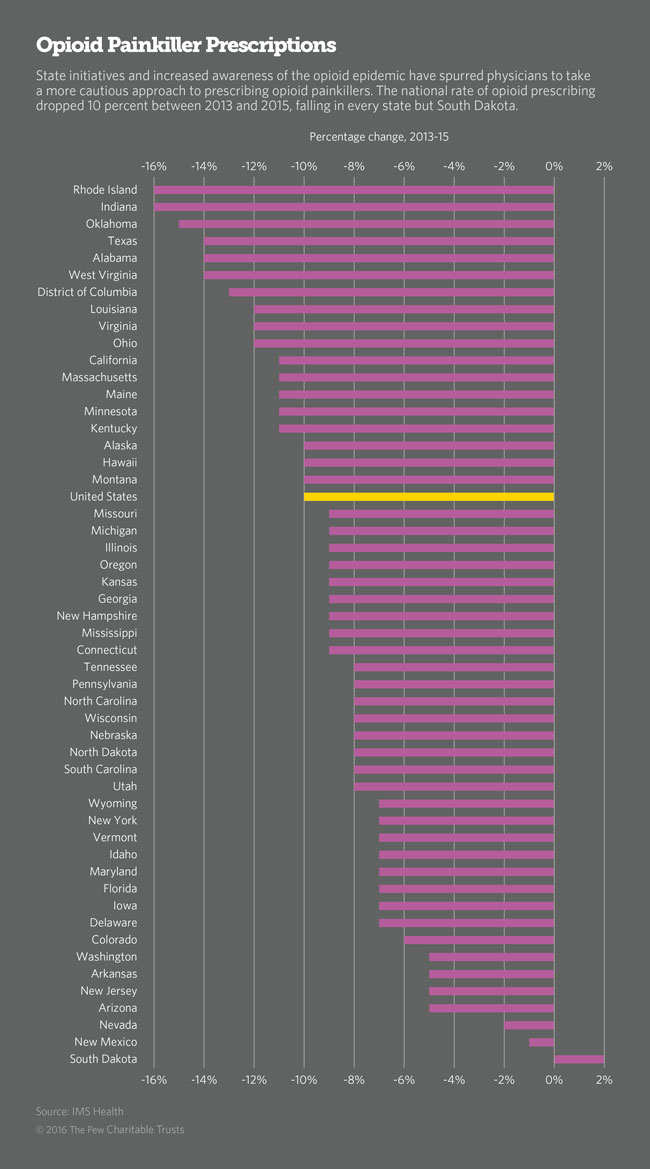Connecting state and local government leaders
As the prescription drug, heroin and fentanyl epidemic escalates, states are enacting laws to curtail painkiller prescribing. Doctors fear unintended consequences.
This article was originally published at Stateline, an initiative of The Pew Charitable Trusts, as part of the Stateline Legislative Review 2016 and was written by Christine Vestal.
For governors and lawmakers in nearly every state, the soaring overdose death toll from prescription painkillers, heroin and fentanyl has become an urgent priority.
Lawmakers in dozens of states took decisive action this year to stanch the flow of prescription pain drugs and help those addicted to them. Roughly 2.5 million Americans are addicted to opioids, and more than 28,000 people died of overdoses of painkillers or heroin in 2014, the highest toll ever.
To keep even more people from becoming addicted to medicines such as Percocet, OxyContin and Vicodin, lawmakers in five states set limits on the number of pills a physician can prescribe to a patient for the first time. Twenty-nine states beefed up monitoring of filled prescriptions to prevent addicts from “doctor shopping” for more pills.
Sixteen states expanded the use of naloxone, an overdose antidote drug few lawmakers had heard of just a year ago. And at least nine states adopted requirements that Medicaid and other insurers pay for all medically recommended addiction services, just as they would for other diseases, according to the National Conference of State Legislatures (NCSL).
Among lawmakers, governors and the medical community, there is broad support for measures aimed at rescuing people from fatal overdoses, providing more addiction treatment options and keeping highly addictive opioid pain medicines out of the hands of those who might abuse them. More doctors and patients are beginning to eschew opioids for alternatives such as anti-inflammatory medications, exercise, physical therapy, acupuncture and psychotherapy.
But the new laws are not without controversy. In several Northeast states, doctors are balking at new limits on the number of pills hospital emergency departments, physicians, dentists or nurses can prescribe for acute pain. Prominent medical groups, including the American Medical Association, argue that doctors and patients, rather than lawmakers, should be able to balance the need for pain relief against the risk of addiction in individual cases.

Prescribing Limits
Dr. Yngvild Olsen, past president of the Maryland Society of Addiction Medicine, said the prescription limits, typically a seven-day supply of pills for a minor procedure or injury such as a tooth extraction or sprained ankle, could cause some doctors to simply stop prescribing opioids because many of them bristle at being told how to practice.
“Arbitrary pill limits or dosage limits are not the way to go,” said Dr. Patrice Harris, chairwoman of AMA’s committee on opioid abuse. “They are one-size-fits-all, blunt approaches.”
Dr. Andrew Kolodny, director of Physicians for Responsible Opioid Prescribing, said patients would be better served if states urged doctors to talk to them about the risk of addiction and required a signed informed consent before prescribing. States also could require doctors to write a detailed treatment plan before prescribing opioids, and insist that prescribers seek prior authorization from a pain expert before prescribing high doses of opioids, he said.
In March, the U.S. Centers for Disease Control and Prevention released recommendations for primary care physicians and others who prescribe opioid painkillers, the first time a federal agency has issued prescribing directives. The agency called on prescribers to voluntarily limit their first prescriptions for acute pain to a three-day supply or less, rather than a 30-day supply, which is common practice in most hospitals and physicians’ offices. The final guidelines noted that “more than seven days will rarely be needed.”
After the CDC released its preliminary recommendations late last year, Massachusetts Gov. Charlie Baker proposed a mandatory three-day limit on first-time opioid prescriptions. State legislators opposed three days but agreed to seven, and Baker, a Republican, signed the compromise bill in March.
Seven-day limits also were adopted in Connecticut, New York, Maine and Rhode Island this year. Vermont left the precise number of days or pills for acute pain up to the state Health Department, which will consult with the state Medical Society before issuing a final rule.
In part, states were spurred to action by a National Governors Association committee formed to develop a unified state response to the opioid crisis.
At a February meeting of the group, Vermont Gov. Peter Shumlin, a Democrat, called on fellow governors to stop doctors from handing out painkillers like candy or prescribing them “just in case” a patient needs them.
Prescription Drug Monitoring
In contrast to prescribing limits, there is little resistance to tougher prescription monitoring laws. States have been tracking prescriptions for opioids and other federally regulated substances since the 1930s, primarily as a tool for law enforcement. Today, every state except Missouri has some type of tracking system, but the rules governing who has access to the information, how quickly pharmacies must enter dispensing data, and which medications are included vary widely.
By tapping into a database of prescriptions, doctors can check patients’ opioid medication history, as well as their use of other potentially harmful drugs, such as sedatives and muscle relaxants, to better assess the risk of addiction or overdose death. A new study by researchers at Vanderbilt University in Tennessee found that state tracking systems have helped lower overdose deaths over the last 20 years.
This year at least 29 states updated their prescription monitoring statutes to improve their effectiveness.
Updates include requirements that pharmacists track more medications and upload the data as prescriptions are filled rather than weekly or monthly, new provisions allowing prescribers to delegate a member of their team to access the confidential information, and requirements that physicians review nearly all patients’ prescription drug histories before prescribing opioids or other dangerous or addictive medications.
Emergency Overdose Treatment
Most fatal opioid overdose victims die from a lack of oxygen because their lungs shut down one to three hours after taking a drug. That leaves a substantial amount of time for a friend, family member or bystander to administer naloxone (sold as Narcan), which is highly effective at reversing the effects of opioid intoxication.
Naloxone was federally approved in 1971, but until the late 1990s it was only used in hospital emergency departments and operating rooms. Even emergency medical personnel and other first responders did not use the rescue drug initially.
The opioid epidemic, which first took hold in New England and Appalachia around 2006, changed that. As of last week, all but three states — Kansas, Montana and Wyoming — had laws ensuring first responders and others could get access to the life-saving drug.
In addition, at least 32 states and the District of Columbia have so-called good Samaritan laws that provide varying levels of legal immunity to bystanders who call for help when someone has overdosed on drugs.
This year, Alaska, Arizona, Hawaii, Iowa, Missouri and South Dakota enacted naloxone laws. Ohio enacted a “good Samaritan” law and Rhode Island renewed one that had expired.
More Treatment
Since January 2015, several states, including Ohio, Illinois, Indiana, Massachusetts, New Jersey, New Mexico, New York, Rhode Island and West Virginia, have adopted new laws aimed at expanding addiction treatment services for the growing number of people seeking them, according to NCSL.
New York’s new addiction treatment law, for example, requires insurers to give people seeking treatment immediate access to care and to cover at least 14 days of continuous treatment before requiring authorization from providers. It also requires health care providers to use objective, state-approved criteria to determine what level of care a patient needs.
To protect patients from potential overdose, New York’s new law also allows families to seek 72 hours of emergency treatment, up from 48 hours.
Some states, including California, Indiana and Missouri, adopted new Medicaid rules to ensure enrollees with drug addictions have access to high quality treatment options, including medications, residential care and outpatient counseling and therapy, according to the National Association of Medicaid Directors.
An influx of federal money could prompt more states to adopt addiction treatment measures. President Obama’s proposed 2017 budget includes $1.1 billion to help states make medication-assisted treatment more available to opioid addicts.

NEXT STORY: Why Policymakers Should Ask Questions About Budget Estimates



